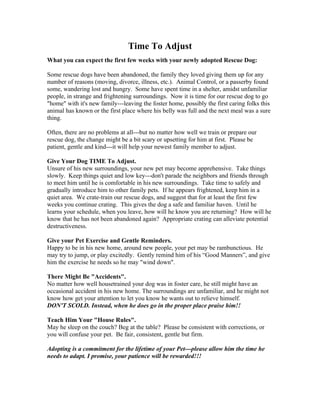Time To Adjust - For Your Newly Adopted Dog
- 1. Time To Adjust What you can expect the first few weeks with your newly adopted Rescue Dog: Some rescue dogs have been abandoned, the family they loved giving them up for any number of reasons (moving, divorce, illness, etc.). Animal Control, or a passerby found some, wandering lost and hungry. Some have spent time in a shelter, amidst unfamiliar people, in strange and frightening surroundings. Now it is time for our rescue dog to go "home" with it's new family---leaving the foster home, possibly the first caring folks this animal has known or the first place where his belly was full and the next meal was a sure thing. Often, there are no problems at all---but no matter how well we train or prepare our rescue dog, the change might be a bit scary or upsetting for him at first. Please be patient, gentle and kind---it will help your newest family member to adjust. Give Your Dog TIME To Adjust. Unsure of his new surroundings, your new pet may become apprehensive. Take things slowly. Keep things quiet and low key---don't parade the neighbors and friends through to meet him until he is comfortable in his new surroundings. Take time to safely and gradually introduce him to other family pets. If he appears frightened, keep him in a quiet area. We crate-train our rescue dogs, and suggest that for at least the first few weeks you continue crating. This gives the dog a safe and familiar haven. Until he learns your schedule, when you leave, how will he know you are returning? How will he know that he has not been abandoned again? Appropriate crating can alleviate potential destructiveness. Give your Pet Exercise and Gentle Reminders. Happy to be in his new home, around new people, your pet may be rambunctious. He may try to jump, or play excitedly. Gently remind him of his âGood Mannersâ, and give him the exercise he needs so he may "wind down". There Might Be "Accidents". No matter how well housetrained your dog was in foster care, he still might have an occasional accident in his new home. The surroundings are unfamiliar, and he might not know how get your attention to let you know he wants out to relieve himself. DON'T SCOLD. Instead, when he does go in the proper place praise him!! Teach Him Your "House Rules". May he sleep on the couch? Beg at the table? Please be consistent with corrections, or you will confuse your pet. Be fair, consistent, gentle but firm. Adopting is a commitment for the lifetime of your Pet---please allow him the time he needs to adapt. I promise, your patience will be rewarded!!!
